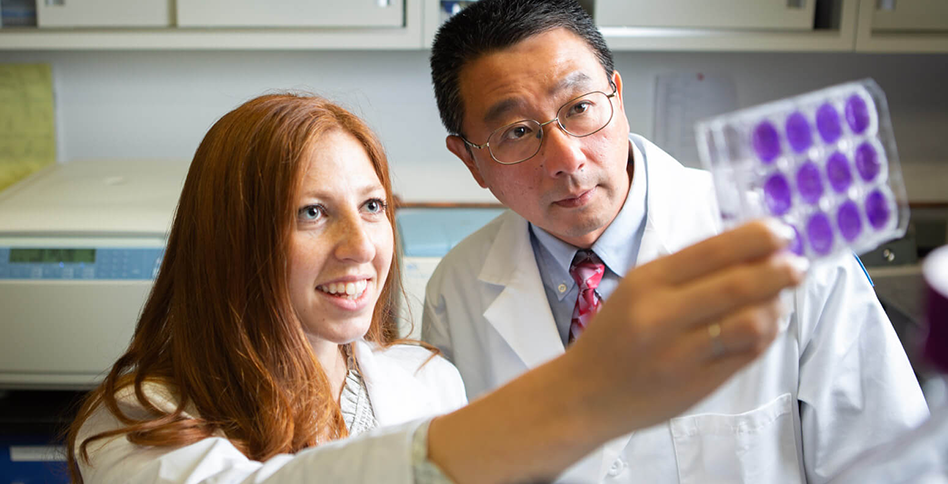
Center for Cancer Research
Biomedical research has entered an exciting and vibrant era. As a result, cancer research demands a multidisciplinary approach that utilizes novel and innovative technologies to fight this devastating disease.
At the NYIT Center for Cancer Research, faculty from different schools within New York Tech work together and utilize multidisciplinary approaches to elucidate the mechanisms of cancer initiation and progression, develop innovative technologies for earlier cancer detection and diagnosis, and discover novel cancer therapy.
In addition, the Center also offers education programs in cancer related subjects to undergraduate, graduate, and medical students and helps to train future cancer researchers who will advance cancer research, as well as future physicians who will provide cutting edge and holistic treatment and care for cancer patients.
Our Mission
Innovation and creativity are encoded in the genes of New York Tech. The mission of the NYIT Center for Cancer Research is to integrate basic science, clinical medicine, and biomedical engineering to advance the early detection and effective treatment of cancers. In addition, the NYIT Center for Cancer Research also commits to promote undergraduate, graduate, and medical education in cancer biology and holistic cancer care to prepare the future cancer researchers and oncologists.
Our Team
Members of NYIT-CCR include faculty from NYIT College of Osteopathic Medicine, NYIT College of Arts and Sciences, and NYIT College of Engineering and Computing Sciences.
Our Research
Faculty at the NYIT-CCR are actively pursuing cancer research in a variety of areas, including cancer development and prevention, cancer diagnosis and therapy, cancer epidemiology as well as clinical oncology.
Cancer Development
- Investigate the effects of alternative and multi-stranded DNA structures on DNA repair and cell death in cancer cells
- Elucidate the effects of DNA repair and DNA damage response on tumorigenesis
- Investigate the anti-cancer potential of drugs such as nonsteroidal anti-inflammatory drug (NSAID) derivatives that are synthesized to release the small gaseous signaling molecules nitric oxide and hydrogen sulfide
- Illustrate the dynamic transcriptomic and epigenetic landscapes in pediatric brain tumors
Cancer Prevention
- Investigate the effects of cannabidiol (CBD) in preventing skin cancers
Cancer Therapeutics
- Discover novel synthetic lethality for cancer therapy
- Identify novel targets for treating glioblastoma and pancreatic cancers
- Develop the next generation of DNA microarrays for drug discovery
Cancer Diagnosis
- Develop novel micro/nanodevices for early cancer diagnosis
Cancer Epidemiology
- Investigate the association of H. pylori and colorectal adenoma
- Investigate the association between a history of allergies, asthma, and eczema, and glioma risk
Clinical Oncology
- Gross and micro diagnoses of cancers in cadavers